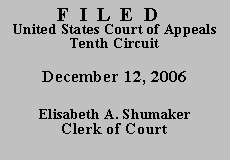

| UNITED STATES OF AMERICA,
Plaintiff-Appellee, Defendant-Appellant. |
No. 06-3147
(D.C. No. 05-CR-10183-JTM) (Kansas) |
On May 22, 2001, Mr. Fajardo-Zamora pled guilty to importing marijuana and was sentenced to 24 months imprisonment. Upon completion of his term of incarceration, Mr. Fajardo-Zamora was deported to Mexico. Three years later, on September 5, 2005, a Kansas state trooper pulled over Mr. Fajardo-Zamora for a cracked windshield and making an unsafe lane change. Following the traffic stop, Mr. Fajardo-Zamora was charged and pled guilty to illegal reentry following deportation for an aggravated felony. Prior to sentencing, the United States Probation Office prepared a presentence report (PSR) and assigned Mr. Fajardo-Zamora a criminal history category of VI, accounting for prior reckless driving, drug importation, contempt of court, and DUI convictions. That criminal history category combined with an offense level of 21 resulted in a guidelines sentencing range of 77 to 96 months.
At sentencing, the government requested a longer sentence that it asserted would more accurately reflect Mr. Fajardo-Zamora's criminal history, but the district court imposed 77 months, a term of imprisonment at the bottom of the guidelines range recommended by the PSR. Mr. Fajardo-Zamora filed a timely notice of appeal.
Anders holds that if counsel finds a case to be wholly frivolous after conscientious examination, he may so advise the court and request permission to withdraw. Counsel must also submit to both the court and his client a brief referring to anything in the record arguably supportive of the appeal. The client may then raise any point he chooses, and the court thereafter undertakes a complete examination of all proceedings and decides whether the appeal is in fact frivolous. If this court so finds, we may grant counsel's request to withdraw and dismiss the appeal. See id. at 744. In this case, we consider both counsel's Anders brief and a supplemental brief submitted by Mr. Fajardo-Zamora.
Mr. Fajardo-Zamora, in his supplemental brief, argues the court's criminal history computations wrongfully assigned him a criminal history category of VI. Specifically, Mr. Fajardo-Zamora claims he should not have been allocated points for a contempt of court offense from the Superior Court, Orange County, California as a result of failure to pay child support. Under the Sentencing Guidelines, state contempt of court offenses are counted for criminal history purposes if "the sentence was a term of probation of at least one year or a term of imprisonment of at least thirty days." U.S.S.G. 4A1.2(c)(1). Mr. Fajardo-Zamora received a suspended seventy day jail sentence and three years of probation upon resolution of the contempt of court charge. Rec., vol. IV at 8. Because three years of probation exceed the one year minimum required for counting a contempt of court offense, the court did not err by including the contempt of court charge in its criminal history calculation.
In his Anders brief, counsel identified one potentially appealable issue for our consideration, namely, whether Mr. Fajardo-Zamora's sentence was unreasonable. As counsel notes, if the district court properly determined the guidelines sentence, which it did in this case, we then determine whether the sentence imposed is reasonable in light of the factors set forth in 18 U.S.C. § 3553(a). United States v. Kristl, 437 F.3d 1050, 1054-55 (10th Cir. 2006). A within-guidelines sentence is "entitled to a rebuttable presumption of reasonableness." Id. at 1054. Considering Mr. Fajardo-Zamora's lengthy criminal history and the court's bottom-of-the guidelines sentence, we hold Mr. Fajardo-Zamora has not rebutted this presumption of reasonableness.
After careful review of the entire proceedings, we conclude the record presents no ground for appeal. We have found nothing to indicate the court slotted Mr. Fajardo-Zamora in the wrong criminal history category, nor that Mr. Fajardo-Zamora's sentence was unreasonable in light of the § 3553(a) factors. We GRANT counsel's request to withdraw and we DISMISS the appeal.
ENTERED FOR THE COURT
Stephanie K. Seymour
Circuit Judge
*.After examining appellant's brief and the appellate record, this panel has determined unanimously that oral argument would not materially assist the determination of this appeal. See Fed. R. App. P. 34(a)(2) and 10th Cir. R. 34.1(G). The case is therefore submitted without oral argument. This order and judgment is not binding precedent except under the doctrines of law of the case, res judicata and collateral estoppel. It may be cited, however, for its persuasive value consistent with Fed. R. App. P. 32.1 (eff. Dec. 1, 2006) and 10th Cir. R. 32.1 (eff. Jan. 1, 2007).